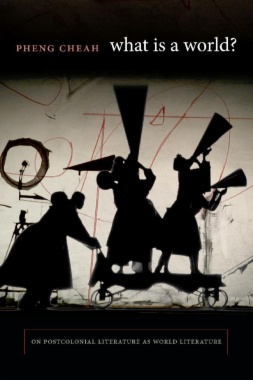In What Is a World? Pheng Cheah, a leading theorist of cosmopolitanism, offers the first critical consideration of world literature’s cosmopolitan vocation. Addressing the failure of recent theories of world literature to inquire about the meaning of world, Cheah articulates a normative theory of literature’s world-making power by creatively synthesizing four philosophical accounts of the world as a temporal process: idealism, Marxist materialism, phenomenology, and deconstruction. Literature opens worlds, he provocatively suggests, because it is a force of receptivity. Cheah compellingly argues for postcolonial literature’s exemplarity as world literature through readings of narrative fiction by Michelle Cliff, Amitav Ghosh, Nuruddin Farah, Ninotchka Rosca, and Timothy Mo that show how these texts open up new possibilities for remaking the world by negotiating with the inhuman force that gives time and deploying alternative temporalities to resist capitalist globalization.
- Cover
- Contents
- Acknowledgments
- Introduction: Missed Encounters: Cosmopolitanism, World Literature, and Postcoloniality
- PART I. The World of World Literature in Question
- 1. The New World Literature: Literary Studies Discovers Globalization
- 2. The World According to Hegel: Culture and Power in World History
- 3. The World as Market: The Materialist Inversion of Spiritualist Models of the World
- PART II. Worlding and Unworlding: Worldliness, Narrative, and “Literature” in Phenomenology and Deconstruction
- 4. Worlding: The Phenomenological Concept of Worldliness and the Loss of World in Modernity
- 5. The In-Between World: Anthropologizing the Force of Worlding
- 6. The Arriving World: The Inhuman Otherness of Time as Real Messianic Hope
- PART III. Of Other Worlds to Come
- 7. Postcolonial Openings: How Postcolonial Literature Becomes World Literature
- 8. Projecting a Future World from the Memory of Precolonial Time
- 9. World Heritage Preservation and the Expropriation of Subaltern Worlds
- 10. Resisting Humanitarianization
- Epilogue: Without Conclusion: Stories without End(s)
- Notes
- Select Bibliography
- Index

